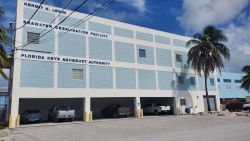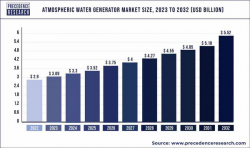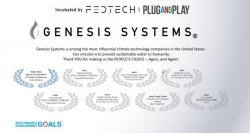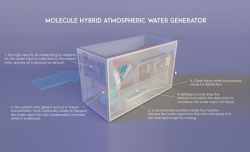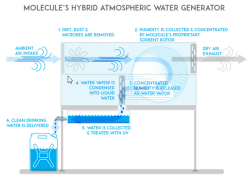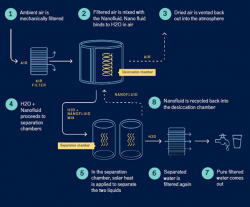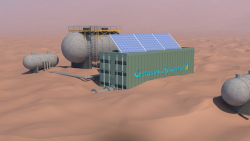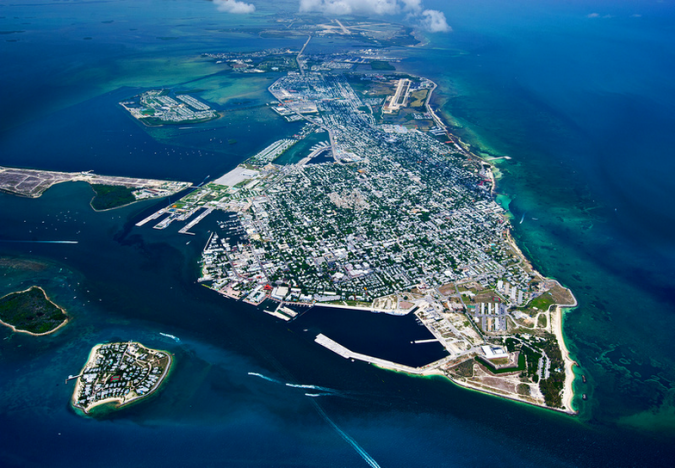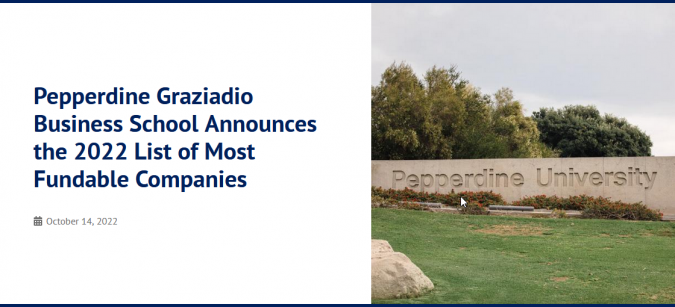Fresh water generation independence is here, is a technology capable of producing millions of gallons of fresh water daily, day after day, and is at the cutting edge of low energy, clean-tech, naturally renewing environmentalism. No longer would Key West be stuck relying on fresh water from a vulnerable, 196 mile, old tech pipeline from the Biscayne Aquifer plus treatment stations plus pumping stations plus storage tanks as it has since 1942. That pipeline is a costly, complicated, public works replace and repair nightmare with no end in sight. Why not new water technology?
20-Year $2B Water System Master Plan
________________________________________________________________________________________
The Florida Keys Aqueduct Authority (FKAA) operates within the domain and under the guidance of the South Florida Water Management District. FKAA is the sole potable water provider for the Florida Keys and is now initiating a 20 year, $2B repair and rehabilitation of the entire potable water system in the Florida Keys.
This largest and most comprehensive rehab project ever for FKAA has several key components:
- Build a new administration building in Key West ($22M)
- Construct a new wellfield consisting of 3 new fresh water wells in the Biscayne Aquifer plus interconnect piping ($7.5M)
- Replace 196 miles of transmission pipeline ($900M)
- Replace 600 miles of distribution pipeline ($683M)
- Minor upgrades to the J. Robert Dean Water Treatment Plant in Florida City ($2M)
- Capital improvements to all 6 transmission pumping stations ($35M)
- Replace all 16 distribution system pumping stations ($53M)
- Replace all transmission storage tanks ($39M)
- Replace all 29 distribution storage tanks ($29M)
- Construct a new reverse osmosis plant in Marathon ($20M) (This may or may not happen)
- Construct a new reverse osmosis plant on Stock Island ($50M) (This will happen regardless of Marathon)
The project uses the newest and most applicable materials and instruments available but inserts ZERO advanced water technologies. As has been the practice since 1942, water will continue to be extracted and pumped from the ground, cleaned, treated and transmitted over hundreds of miles of pipeline with localized storage and old technology reverse osmosis plant(s) as backup to extraction restrictions or system breakages.
Fresh water generation technology
Here is the list of existing fresh water generation technologies. They are:
- Desalination through reverse osmosis or distillation
- Atmospheric water generation
- Hydropanel
Each of the above technologies has a proven track record with specific niche markets. Below I am talking about a new and revolutionary set of integrated technologies that can produce millions of gallons of fresh water daily, day after day - a technology that is safe, healthy, reliable, low energy, consistently renewable, has zero negative environmental impact and is locally controlled and cost effective.
The technology is “water from air - anywhere” and is the genius of Genesis Systems.
Who is Genesis Systems?
Genesis Systems is based in Tampa, FL. Genesis’ patented sorbent technologies can create tens of millions of gallons a day of sustainable fresh water from air by harvesting atmospheric humidity into special liquids that mimic how oceans absorb humidity. Genesis’s water supply production system produces no pollution, no hazardous bi-products and incurs no copious water rights issues.
Production facilities are entirely scalable; as local authorities determine that additional quantities of fresh water are needed, existing plants can be readily enhanced and expanded as needed.
Genesis Systems recently acquired a California and Ireland based, award winning water-tech company named Molecule. Molecule’s hybrid Atmospheric Water Generator (AWG) design uses a new sorbent technology to concentrate humidity before condensing it, allowing the system to outperform all other AWGs in efficiency and harsh environment condition performance. Whereas other company AWG’s function very well when the humidity is greater than 60% relative humidity, Molecule’s sorbent technology bridges the water vapor barrier, enabling low temperature / low humidity atmospheric water generation where other AWGs (which rely only on crossing the dew point) fail to operate.
Greater efficiencies are experienced in humid environments and is one reason why the City of Tampa is initiating a pilot project from Genesis that may result in the generation of 30 million gallons per day in fresh water. A pilot project to produce water from air is already underway at the Port of San Antonio in San Antonio, Texas.
Health and Safety
All water quality data from the FKAA shows Keys water meets or exceeds all existing quality and safety standards set by state and federal water governance agencies. The FKAA closely monitors a plethora of EPA standards associated with extracting water out of the ground; namely, saline intrusion into the fresh water wellfield, chloride levels and microbials, the lime feed system and the dewatering of associated solids, chemical injection points, agricultural operations and herbicides and pesticides, hypersaline and tritium from Turkey Point closed loop cooling …
The EPA has determined that per- and polyfluoroalkyl substances (PFAS) may result in changes in liver, immune and thyroid functions as well as create an increased risk in some cancers. Testing at the Biscayne Aquifer has revealed the presence of PFAS’ at concentrations of 60 parts per trillion which is lower than EPA minimum of 70 parts per trillion. FKAA has installed a pilot plant at the Florida City treatment facility to evaluate the removal of PFAS using granular activated carbon. Full implementation of PFAS removal is under evaluation.
AWG water does not incur these many biological and chemical concerns or costs. Fresh water is generated from air and is immediately drinkable.
Lifecycle and Infrastructure
Fresh water use rates in the Florida Keys and Key West vary seasonally, more in the tourist-winter and less in the non-tourist-summer, with an average daily usage rate holding steady at approximately 18.5 million gallons daily (MGD) in 2023 and estimated to increase to 19MGD in 2040. Of this, 58% is residential and 35% is commercial. The Navy is FKAA’s largest single customer with an average use rate of .73MGD; however, the contract between the Navy and FKAA calls for FKAA to provide up to 2.4MGD.
Water loss, aka non-revenue water, in the existing system is substantial. Non-revenue water is the difference between the amount of water that leaves the treatment plants and the amount of water billed at the customer site. Non-revenue water consists of unauthorized consumption, metering errors and leaks in the system. Presently, approximately 23% of total water production is lost to non-revenue water, overwhelmingly from leaks in the pipes.
Water supply wells have a 50 year lifecycle. During FKAA’s 20-year plan, three of the ten wells in the Biscayne Aquifer are scheduled for replacement.
Engineered Dessicant Technology
Atmospheric humidity is an untapped and completely and consistently renewable water resource that can help solve the world water crisis.
To make the Molecule/Genesis Hybrid Atmospheric Water Generator work in extreme environments, a new desiccant material named Regeneration Optimized Sorbent (ROS) was engineered. A desiccant material absorbs water from the air, like silica. ROS has a greater absorption capacity, better efficiency, and a wider environmental operating range than the silica normally used in desiccant dehumidifiers. A key attribute of ROS’ efficiency in absorbing water from air is because it functions at a much lower temperature than almost all other desiccants. The lower the functional temperature, the wider the temperature range of absorption, meaning ROS can absorb water over a much broader range of temperatures than other desiccants.
ROS enables atmospheric water generation to now be a reality in almost any environment on the Earth. ROS pulls clean drinking water directly from the air. No treatment or sanitizing required. ROS is technologically disruptive and delivers a significant environmental, social and humanitarian solution all in one. Molecule and their ROS technology won “Innovation of the Year 2020” from the Irish Laboratory Awards for the technology.
Atmospheric water renews itself EVERY DAY.
Show me the Money
FKAA has tapped a variety of financial resources for this $2B tab; in essence, existing water reserves, water rate increases and the issuance of additional revenue bonds. Existing (2023 - 2033) debt service is approximately $11M per annum. FKAA has covenanted that net revenues plus impact fees will be made adequate to pay 120% of debt service. Additional debt service is contingent on FKAA revenues, which is pre-calculated as 3% per annum rate increases from 2020 – 2024 or, a cumulative rate increase of 17.5% between 2020 -2024. Funding needs analysis occurs within rolling 5-year planning horizons, reviewed annually, with the objective being a balancing of funding needed to support capital improvements, revenue increases as necessary and the maintenance of FKAA’s credit rating and worthiness.
As water system assets reach the end of their useful lives, FKAA will need to triple the level of capital investment from its historic budget of $8M per year to $25M per year. And yet, no new technology is a part of its Capital Improvement Program (CIP). The CIP maintains the status quo.
On the other hand, the Genesis AWG process requires minimal energy; therefore, it can be powered by a variety of clean energy sources such as wind or solar. Running entirely on green energy and renewables, Genesis AWG is the only technology in existence that can provide up to 10,000,000 gallons of water per day with no access to a water source required. Requiring only approximately 0.5 kilowatts or less of energy per gallon, the Genesis AWG technology drives the cost of potable water toward parity with many municipal and desalination water systems.
Stock Island Reverse Osmosis (SIRO)
Reverse Osmosis in Monroe County consists of a single plant in Marathon with a 1MGD capacity and two plants in Stock Island with a total of 2MGD. Both Marathon and Key West use reverse osmosis membranes to convert seawater to potable water. Chlorine and ammonia (chloramines) are added for disinfection. Reverse osmosis is very energy intensive and has a significant waste byproduct – brine.
The Marathon plant requires extensive overhaul ($20M) and the SIRO facility is planned to be completely replaced ($50M). If the benefit-cost of overhauling the Marathon plant is negative, Marathon will not be completed and the SIRO will carry the entire load. The new SIRO plant would provide supplemental/emergency capacity, 4 – 6MGD, to meet maximum day conditions during periods of drought. During drought conditions, the South Florida Water Management District can impose a limit on how much water FKAA can extract from the Biscayne Aquifer. The deficit between what can be extracted and what is needed cannot be presently covered by the existing reverse osmosis plants in Marathon or Stock Island, both of which are marginally functional – if at all.
After work completion, both reverse osmosis facilities will require $4M per year in operations and maintenance (O&M).
Conclusion
The Florida Keys Aqueduct Authority is in the beginning of a 20 year, $2B public works jobs project to re-pipe the Florida Keys and perform maintenance and upgrades on the 26 pumping stations and 6 treatment centers that carry 18 - 19 million gallons of fresh water daily to the citizens of the Florida Keys. Approximately 8 miles of road in the Upper Keys are today being torn up as the new pipe is being laid – at a cost of $9M per mile.
Without incentives, 20 years is likely short of the actual time period to completion and once finished, unscheduled maintenance will likely continue to be the norm – an endless public works project that ever so steadily depletes a slowly replenishing asset – aquifer water.
Will $2B cover the final cost? At what point will Tallahassee stop the grants or credit agencies stop the financing?
Meanwhile, fresh water independence is available now. The Genesis Systems technology is the future; scientifically and fiscally sound, clean, energy efficient, naturally renewable and is ideally suited for the geography of an isolated population like Key West. True, present day fresh water extraction, treatment, transmission and distribution is not at a crisis point in the Keys but why not take this opportunity to discard the same old status quo and GET AHEAD of fresh water generation. Tomorrow's water depends on today's innovations.
Is not the Stock Island Reverse Osmosis plant site an ideal location to develop a pilot program with Genesis?
Water, water everywhere – here are your Genesis gallons to drink.
If you have any comments or questions, please contact me here.
Good luck.
Pepperdine Graziadio Business School revealed its list of 16 Most Fundable Companies® during its reveal event at the Villa Graziadio Executive Center. Among the 4000 entries, the event’s top three startup recognitions were EarthGrid, PBC., Genesis Systems, LLC., and One Health Group, Inc., all of which received a Platinum designation, the highest recognition attainable.
Additional Sources:





